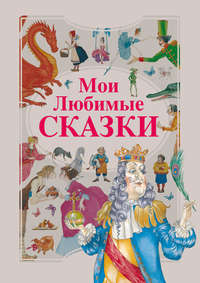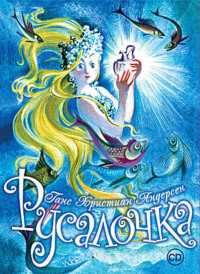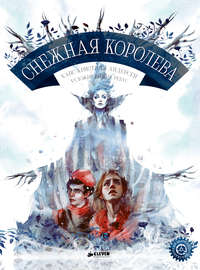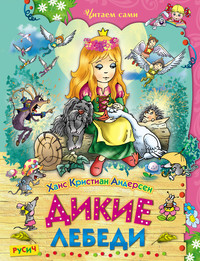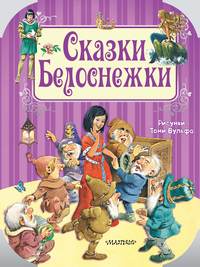 полная версия
полная версияWhat the Moon Saw: and Other Tales
"Yes, what I gave you to write," retorted the Inkstand. "That was a cut at you, because of your conceit. That you should not even have understood that you were being quizzed! I gave you a cut from within me – surely I must know my own satire!"
"Ink-pipkin!" cried the Pen.
"Writing-stick!" cried the Inkstand.
And each of them felt a conviction that he had answered well; and it is a pleasing conviction to feel that one has given a good answer – a conviction on which one can sleep; and accordingly they slept upon it. But the poet did not sleep. Thoughts welled up from within him, like the tones from the violin, falling like pearls, rushing like the storm-wind through the forests. He understood his own heart in these thoughts, and caught a ray from the Eternal Master.
To Him be all the honour!
THE CHILD IN THE GRAVE
There was mourning in the house, sorrow in every heart. The youngest child, a boy four years old, the joy and hope of his parents, had died. There still remained to them two daughters, the elder of whom was about to be confirmed – good, charming girls both; but the child that one has lost always seems the dearest; and here it was the youngest, and a son. It was a heavy trial. The sisters mourned as young hearts can, and were especially moved at the sight of their parents' sorrow. The father was bowed down, and the mother completely struck down by the great grief. Day and night she had been busy about the sick child, and had tended, lifted, and carried it; she had felt how it was a part of herself. She could not realize that the child was dead, and that it must be laid in a coffin and sleep in the ground. She thought God could not take this child from her; and when it was so, nevertheless, and there could be no more doubt on the subject, she said in her feverish pain:
"God did not know it. He has heartless servants here on earth, who do according to their own liking, and hear not the prayers of a mother."
In her grief she fell away from God, and then there came dark thoughts, thoughts of death, of everlasting death, that man was but dust in the dust, and that with this life all was ended. But these thoughts gave her no stay, nothing on which she could take hold; and she sank into the fathomless abyss of despair.
In her heaviest hours she could weep no more, and she thought not of the young daughters who were still left to her. The tears of her husband fell upon her forehead, but she did not look at him. Her thoughts were with the dead child; her whole thought and being were fixed upon it, to call back every remembrance of the little one, every innocent childish word it had uttered.
The day of the funeral came. For nights before the mother had not slept; but in the morning twilight she now slept, overcome by weariness; and in the meantime the coffin was carried into a distant room, and there nailed down, that she might not hear the blows of the hammer.
When she awoke, and wanted to see her child, the husband said,
"We have nailed down the coffin. It was necessary to do so."
"When God is hard towards me, how should men be better?" she said, with sobs and groans.
The coffin was carried to the grave. The disconsolate mother sat with her young daughters. She looked at her daughters, and yet did not see them, for her thoughts were no longer busy at the domestic hearth. She gave herself up to her grief, and grief tossed her to and fro as the sea tosses a ship without compass or rudder. So the day of the funeral passed away, and similar days followed, of dark, wearying pain. With moist eyes and mournful glances, the sorrowing daughters and the afflicted husband looked upon her who would not hear their words of comfort; and, indeed, what words of comfort could they speak to her, when they themselves were heavily bowed down?
It seemed as though she knew sleep no more; and yet he would now have been her best friend, who would have strengthened her body, and poured peace into her soul. They persuaded her to seek her couch, and she lay still there, like one who slept. One night her husband was listening, as he often did, to her breathing, and fully believed that she had now found rest and relief. He folded his arms and prayed, and soon sank into a deep healthy sleep; and thus he did not notice that his wife rose, threw on her clothes, and silently glided from the house, to go where her thoughts always lingered – to the grave which held her child. She stepped through the garden of the house, and over the fields, where a path led to the churchyard. No one saw her on her walk – she had seen nobody, for her eyes were fixed upon the one goal of her journey.
It was a lovely starlight night; the air was still mild; it was in the beginning of September. She entered the churchyard, and stood by the little grave, which looked like a great nosegay of fragrant flowers. She sat down, and bowed her head low over the grave, as if she could have seen her child through the intervening earth, her little boy, whose smile rose so vividly before her – the gentle expression of whose eyes, even on the sick bed, she could never forget. How eloquent had that glance been, when she had bent over him, and seized his delicate hand, which he had no longer strength to raise! As she had sat by his crib, so she now sat by his grave, but here her tears had free course, and fell thick upon the grave.
"Thou wouldst gladly go down and be with thy child," said a voice quite close to her, a voice that sounded so clear and deep, it went straight to her heart. She looked up; and near her stood a man wrapped in a black cloak, with a hood drawn closely down over his face. But she glanced keenly up, and saw his face under his hood. It was stern, but yet awakened confidence, and his eyes beamed with the radiance of youth.
"Down to my child!" she repeated; and a despairing supplication spoke out of her words.
"Darest thou follow me?" asked the form. "I am Death."
And she bowed her head in acquiescence. Then suddenly it seemed as though all the stars were shining with the radiance of the full moon; she saw the varied colours of the flowers on the grave, and the covering of earth was gradually withdrawn like a floating drapery; and she sank down, and the apparition covered her with a black cloak; night closed around her, the night of death, and she sank deeper than the sexton's spade can penetrate; and the churchyard was as a roof over her head.
A corner of the cloak was removed, and she stood in a great hall which spread wide and pleasantly around. It was twilight. But in a moment her child appeared, and was pressed to her heart, smiling at her in greater beauty than he had ever possessed. She uttered a cry, but it was inaudible. A glorious swelling strain of music sounded in the distance, and then near to her, and then again in the distance: never had such tones fallen on her ear; they came from beyond the great dark curtain which separated the hall from the great land of eternity beyond.
"My sweet darling mother," she heard her child say. It was the well-known, much-loved voice, and kiss followed kiss in boundless felicity; and the child pointed to the dark curtain.
"It is not so beautiful on earth. Do you see, mother – do you see them all? Oh, that is happiness!"
But the mother saw nothing which the child pointed out – nothing but the dark night. She looked with earthly eyes, and could not see as the child saw, which God had called to Himself. She could hear the sounds of the music, but she heard not the word —the Word in which she was to believe.
"Now I can fly, mother – I can fly with all the other happy children into the presence of the Almighty. I would fain fly; but, if you weep as you are weeping now, I might be lost to you – and yet I would go so gladly. May I not fly? And you will come to me soon – will you not, dear mother?"
"Oh, stay! stay!" entreated the mother. "Only one moment more – only once more I should wish to look at thee, and kiss thee, and press thee in my arms."
And she kissed and fondled the child. Then her name was called from above – called in a plaintive voice. What might this mean?
"Hearest thou?" asked the child. "It is my father who calls thee."
And in a few moments deep sighs were heard, as of weeping children.
"They are my sisters," said the child. "Mother, you surely have not forgotten them?"
And then she remembered those she had left behind. A great terror came upon her. She looked out into the night, and above her dim forms were flitting past. She seemed to recognize a few more of these. They floated through the Hall of Death towards the dark curtain, and there they vanished. Would her husband and her daughter thus flit past? No, their sighs and lamentations still sounded from above: – and she had been nearly forgetting them for the sake of him who was dead!
"Mother, now the bells of heaven are ringing," said the child. "Mother, now the sun is going to rise."
And an overpowering light streamed in upon her. The child had vanished, and she was borne upwards. It became cold round about her, and she lifted up her head, and saw that she was lying in the churchyard, on the grave of her child.
But the Lord had been a stay unto her feet, in a dream, and a light to her spirit; and she bowed her knees and prayed for forgiveness that she had wished to keep back a soul from its immortal flight, and that she had forgotten her duties towards the living who were left to her.
And when she had spoken those words, it was as if her heart were lightened. Then the sun burst forth, and over her head a little bird sang out, and the church bells sounded for early service. Everything was holy around her, and her heart was chastened. She acknowledged the goodness of God, she acknowledged the duties she had to perform, and eagerly she went home. She bent over her husband, who still slept; her warm devoted kiss awakened him, and heart-felt words of love came from the lips of both. And she was gentle and strong, as a wife can be; and from her came the consoling words,
"God's will is always the best."Then her husband asked her,
"From whence hast thou all at once derived this strength – this feeling of consolation?"
And she kissed him, and kissed her children, and said, "They came from God, through the child in the grave."
SOUP ON A SAUSAGE-PEG
I
"That was a remarkably fine dinner yesterday," observed an old Mouse of the female sex to another who had not been at the festive gathering. "I sat number twenty-one from the old mouse king, so that I was not badly placed. Should you like to hear the order of the banquet? The courses were very well arranged – mouldy bread, bacon-rind, tallow candle, and sausage – and then the same dishes over again from the beginning: it was just as good as having two banquets in succession. There was as much joviality and agreeable jesting as in the family circle. Nothing was left but the pegs at the ends of the sausages. And the discourse turned upon these; and at last the expression, 'Soup on sausage-rinds,' or, as they have the proverb in the neighbouring country, 'Soup on a sausage-peg,' was mentioned. Every one had heard the proverb, but no one had ever tasted the sausage-peg soup, much less prepared it. A capital toast was drunk to the inventor of the soup, and it was said he deserved to be a relieving officer. Was not that witty? And the old mouse king stood up, and promised that the young female mouse who could best prepare that soup should be his queen; and a year was allowed for the trial."
"That was not at all bad," said the other Mouse; "but how does one prepare this soup?"
"Ah, how is it prepared? That is just what all the young female mice, and the old ones too, are asking. They would all very much like to be queen; but they don't want to take the trouble to go out into the world to learn how to prepare the soup, and that they would certainly have to do. But every one has not the gift of leaving the family circle and the chimney corner. In foreign parts one can't get cheese-rinds and bacon every day. No, one must bear hunger, and perhaps be eaten up alive by a cat."
Such were probably the considerations by which the majority were deterred from going out into the wide world and gaining information. Only four mice announced themselves ready to depart. They were young and brisk, but poor. Each of them wished to proceed to one of the four quarters of the globe, and then it would become manifest which of them was favoured by fortune. Every one took a sausage-peg, so as to keep in mind the object of the journey. The stiff sausage-peg was to be to them as a pilgrim's staff.
It was at the beginning of May that they set out, and they did not return till the May of the following year; and then only three of them appeared. The fourth did not report herself, nor was there any intelligence of her, though the day of trial was close at hand.
"Yes, there's always some drawback in even the pleasantest affair," said the Mouse King.
And then he gave orders that all mice within a circuit of many miles should be invited. They were to assemble in the kitchen, where the three travelled mice would stand up in a row, while a sausage-peg, shrouded in crape, was set up as a memento of the fourth, who was missing. No one was to proclaim his opinion till the mouse king had settled what was to be said. And now let us hear.
II
What the first little Mouse had seen and learnt in her travels"When I went out into the wide world," said the little Mouse, "I thought, as many think at my age, that I had already learnt everything; but that was not the case. Years must pass before one gets so far. I went to sea at once. I went in a ship that steered towards the north. They had told me that the ship's cook must know how to manage things at sea; but it is easy enough to manage things when one has plenty of sides of bacon, and whole tubs of salt pork, and mouldy flour. One has delicate living on board; but one does not learn to prepare soup on a sausage-peg. We sailed along for many days and nights; the ship rocked fearfully, and we did not get off without a wetting. When we at last reached the port to which we were bound, I left the ship; and it was high up in the far north.
"It is a wonderful thing, to go out of one's own corner at home, and sail in a ship, where one has a sort of corner too, and then suddenly to find oneself hundreds of miles away in a strange land. I saw great pathless forests of pine and birch, which smelt so strong that I sneezed, and thought of sausage. There were great lakes there too. When I came close to them the waters were quite clear, but from a distance they looked black as ink. Great swans floated upon them: I thought at first they were spots of foam, they lay so still; but then I saw them walk and fly, and I recognized them. They belong to the goose family – one can see that by their walk; for no one can deny his parentage. I kept with my own kind. I associated with the forest and field mice, who, by the way, know very little, especially as regards cookery, though this was the very subject that had brought me abroad. The thought that soup might be boiled on a sausage-peg was such a startling statement to them, that it flew at once from mouth to mouth through the whole forest. They declared the problem could never be solved; and little did I think that there, in the very first night, I should be initiated into the method of its preparation. It was in the height of summer, and that, the mice said, was the reason why the wood smelt so strongly, and why the herbs were so fragrant, and the lakes so transparent and yet so dark, with their white swimming swans.
"On the margin of the wood, among three or four houses, a pole as tall as the mainmast of a ship had been erected, and from its summit hung wreaths and fluttering ribbons: this was called a maypole. Men and maids danced round the tree, and sang as loudly as they could, to the violin of the fiddler. There were merry doings at sundown and in the moonlight, but I took no part in them – what has a little mouse to do with a May dance? I sat in the soft moss and held my sausage-peg fast. The moon threw its beams especially upon one spot, where a tree stood, covered with moss so exceedingly fine, I may almost venture to say it was as fine as the skin of the mouse king; but it was of a green colour, and that is a great relief to the eye.
"All at once, the most charming little people came marching forth. They were only tall enough to reach to my knee. They looked like men, but were better proportioned: they called themselves elves, and had delicate clothes on, of flower leaves trimmed with the wings of flies and gnats, which had a very good appearance. Directly they appeared, they seemed to be seeking for something – I know not what; but at last some of them came towards me, and the chief pointed to my sausage-peg, and said, 'That is just such a one as we want – it is pointed – it is capital!' and the longer he looked at my pilgrim's staff the more delighted he became.
"'I will lend it,' I said, 'but not to keep.'
"'Not to keep!' they all repeated; and they seized the sausage-peg, which I gave up to them, and danced away to the spot where the fine moss grew; and here they set up the peg in the midst of the green. They wanted to have a maypole of their own, and the one they now had seemed cut out for them; and they decorated it so that it was beautiful to behold.
"First, little spiders spun it round with gold thread, and hung it all over with fluttering veils and flags, so finely woven, bleached so snowy white in the moonshine, that they dazzled my eyes. They took colours from the butterfly's wing, and strewed these over the white linen, and flowers and diamonds gleamed upon it, so that I did not know my sausage-peg again: there is not in all the world such a maypole as they had made of it. And now came the real great party of elves. They were quite without clothes, and looked as genteel as possible; and they invited me to be present at the feast; but I was to keep at a certain distance, for I was too large for them.
"And now began such music! It sounded like thousands of glass bells, so full, so rich, that I thought the swans were singing. I fancied also that I heard the voice of the cuckoo and the blackbird, and at last the whole forest seemed to join in. I heard children's voices, the sound of bells, and the song of birds; the most glorious melodies – and all came from the elves' maypole, namely, my sausage-peg. I should never have believed that so much could come out of it; but that depends very much upon the hands into which it falls. I was quite touched. I wept, as a little mouse may weep, with pure pleasure.
"The night was far too short; but it is not longer up yonder at that season. In the morning dawn the breeze began to blow, the mirror of the forest lake was covered with ripples, and all the delicate veils and flags fluttered away in the air. The waving garlands of spider's web, the hanging bridges and balustrades, and whatever else they are called, flew away as if they were nothing at all. Six elves brought me back my sausage-peg, and asked me at the same time if I had any wish that they could gratify; so I asked them if they could tell me how soup was made on a sausage-peg.
"'How we do it?' asked the chief of the elves, with a smile. 'Why, you have just seen it. I fancy you hardly knew your sausage-peg again?'
"'You only mean that as a joke," I replied. And then I told them in so many words, why I had undertaken a journey, and what great hopes were founded on the operation at home. 'What advantage,' I asked, 'can accrue to our mouse king, and to our whole powerful state, from the fact of my having witnessed all this festivity? I cannot shake it out of the sausage-peg, and say, "Look, here is the peg, now the soup will come." That would be a dish that could only be put on the table when the guests had dined.'
"Then the elf dipped his little finger into the cup of a blue violet, and said to me:
"'See here! I will anoint your pilgrim's staff; and when you go back to your country, and come to the castle of the mouse king, you have but to touch him with the staff, and violets will spring forth and cover its whole surface, even in the coldest winter-time. And so I think I've given you something to carry home, and a little more than something!'"
But before the little Mouse said what this "something more" was, she stretched her staff out towards the king, and in very truth the most beautiful bunch of violets burst forth; and the scent was so powerful, that the mouse king incontinently ordered the mice who stood nearest the chimney to thrust their tails into the fire and create a smell of burning, for the odour of the violets was not to be borne, and was not of the kind he liked.
"But what was the 'something more,' of which you spoke?" asked the Mouse King.
"Why," the little Mouse answered, "I think it is what they call effect!" and herewith she turned the staff round, and lo! there was not a single flower to be seen upon it; she only held the naked skewer, and lifted this up, as a musical conductor lifts his bâton.
"'Violets,' the elf said to me, 'are for sight, and smell, and touch. Therefore it yet remains to provide for hearing and taste!'" And now the little Mouse began to beat time; and music was heard, not such as sounded in the forest among the elves, but such as is heard in the kitchen. There was a bubbling sound of boiling and roasting; and all at once it seemed as if the sound were rushing through every chimney, and pots and kettles were boiling over. The fire-shovel hammered upon the brass kettle, and then, on a sudden, all was quiet again. They heard the quiet subdued song of the tea-kettle, and it was wonderful to hear – they could not quite tell if the kettle were beginning to sing or leaving off; and the little pot simmered, and the big pot simmered, and neither cared for the other: there seemed to be no reason at all in the pots. And the little Mouse flourished her bâton more and more wildly; the pots foamed, threw up large bubbles, boiled over, and the wind roared and whistled through the chimney. Oh! it became so terrible, that the little Mouse lost her stick at last.
"That was a heavy soup!" said the Mouse King. "Shall we not soon hear about the preparation?"
"That was all," said the little Mouse, with a bow.
"That is all! Then we should be glad to hear what the next has to relate," said the Mouse King.
III
What the second little Mouse had to tell"I was born in the palace library," said the second Mouse. "I and several members of our family never knew the happiness of getting into the dining-room, much less into the store-room; on my journey, and here to-day, are the only times I have seen a kitchen. We have indeed often been compelled to suffer hunger in the library, but we got a good deal of knowledge. The rumour penetrated even to us, of the royal prize offered to those who could cook soup upon a sausage-peg; and it was my old grandmother who thereupon ferreted out a manuscript, which she certainly could not read, but which she had heard read out, and in which it was written: 'Those who are poets can boil soup upon a sausage-peg.' She asked me if I were a poet. I felt quite innocent on the subject, and then she told me I must go out, and manage to become one. I again asked what was requisite in that particular, for it was as difficult for me to find that out, as to prepare the soup; but grandmother had heard a good deal of reading, and she said that three things were especially necessary: 'Understanding, imagination, feeling – if you can manage to obtain these three, you are a poet, and the sausage-wide peg affair will be quite easy to you.'
"And I went forth, and marched towards the west, away into the world, to become a poet.
"Understanding is the most important thing in every affair. I knew that, for the two other things are not held in half such respect, and consequently I went out first to seek understanding. Yes, where does he dwell? 'Go to the ant and be wise,' said the great King of the Jews; I knew that from my library experience; and I never stopped till I came to the first great ant-hill, and there I placed myself on the watch, to become wise.
"The ants are a respectable people. They are understanding itself. Everything with them is like a well-worked sum, that comes right. To work and to lay eggs, they say, is to live while you live, and to provide for posterity; and accordingly that is what they do. They were divided into the clean and the dirty ants. The rank of each is indicated by a number, and the ant queen is number one; and her view is the only correct one, she is the receptacle of all wisdom; and that was important for me to know. She spoke so much, and it was all so clever, that it sounded to me like nonsense. She declared her ant-hill was the loftiest thing in the world; though close by it grew a tree, which was certainly loftier, much loftier, that could not be denied, and therefore it was never mentioned. One evening an ant had lost herself upon the tree: she had crept up the stem – not up to the crown, but higher than any ant had climbed until then; and when she turned, and came back home, she talked of something far higher than the ant-hill that she had found in her travels; but the other ants considered that an insult to the whole community, and consequently she was condemned to wear a muzzle, and to continual solitary confinement. But a short time afterwards another ant got on the tree, and made the same journey and the same discovery; and this one spoke with emphasis, and indistinctly, they said; and as, moreover, she was one of the pure ants and very much respected, they believed her; and when she died they erected an egg-shell as a memorial of her, for they had a great respect for the sciences. I saw," continued the little Mouse, "that the ants were always running to and fro with their eggs on their backs. One of them once dropped her egg; she exerted herself greatly to pick it up again, but she could not succeed. Then two others came up, and helped her with all their might, insomuch that they nearly dropped their own eggs over it; but then they certainly at once relaxed their exertions, for each should think of himself first – the ant queen had declared that by so doing they exhibited at once heart and understanding.


